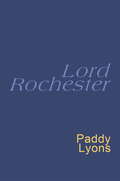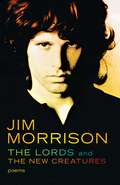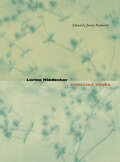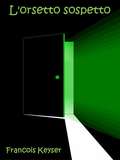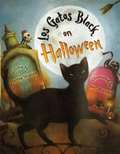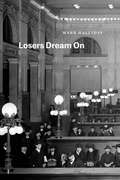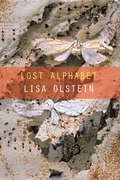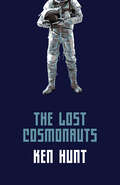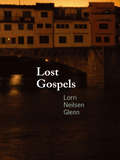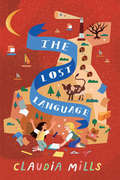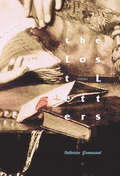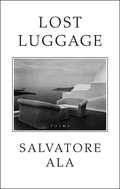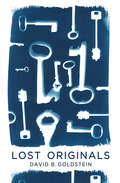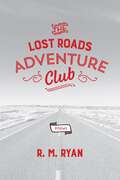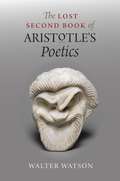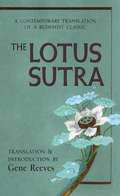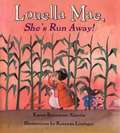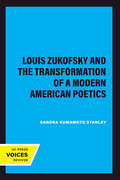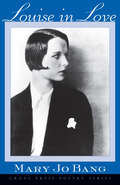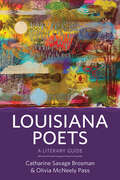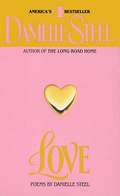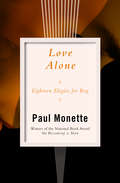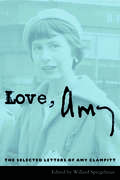- Table View
- List View
Lord Rochester: Everyman's Poetry
by Paddy LyonsThe archetypal Restoration rake, Rochester wrote poems of love, debauchery, erotic obsession and impotence full of honesty and raw power.
Lord Rochester
by Paddy LyonsThe archetypal Restoration rake, Rochester wrote poems of love, debauchery, erotic obsession and impotence full of honesty and raw power.
Lord Rochester in the Restoration World
by Augustine, Matthew C. and Zwicker, Steven N. Matthew C. Augustine Steven N. ZwickerJohn Wilmot, second Earl of Rochester (1647–1680), the notorious and brilliant libertine poet of King Charles II's court, has long been considered an embodiment of the Restoration era. This interdisciplinary collection of essays by leading scholars focuses new attention on, and brings fresh perspectives to, the writings of Lord Rochester. Particular consideration is given to the political force and social identity of Rochester's work, to the worlds - courtly and theatrical, urban and suburban - from which Rochester's poetry emerged and which it discloses, and not least to the unsettling aesthetic power of Rochester's writing. The singularity of Rochester's voice - his 'matchless wit' - has been widely recognised; this book encourages the continued appreciation of all the ways in which Rochester reveals the layered and promiscuous character of literary projects throughout the whole of a brilliant, abrasive, and miscellaneous age.
The Lords and The New Creatures
by Jim MorrisonOriginally published as two separate volumes in 1969, Jim Morrison&’s first published volume of poetry gives a revealing glimpse of an era and the man whose songs and savage performances have left an indelible impression on our culture.Intense, erotic, and enigmatic, Jim Morrison&’s persona is as riveting now as the lead singer/composer &“Lizard King&” was during The Doors&’ peak in the late sixties. His fast life and mysterious death remain controversial even to this day. The Lords and the New Creatures, Morrison&’s first published volume of poetry, is an uninhibited exploration of society&’s dark side—drugs, sex, fame, and death—captured in sensual, seething images. Here, Morrison gives a revealing glimpse at an era and at the man whose songs and savage performances have left their indelible impression on our culture.
Lorine Niedecker: Collected Works
by Lorine Niedecker Jenny Penberthy"The Brontës had their moors, I have my marshes," Lorine Niedecker wrote of flood-prone Black Hawk Island in Wisconsin, where she lived most of her life. Her life by water, as she called it, could not have been further removed from the avant-garde poetry scene where she also made a home. Niedecker is one of the most important poets of her generation and an essential member of the Objectivist circle. Her work attracted high praise from her peers--Marianne Moore, William Carlos Williams, Louis Zukofsky, Cid Corman, Clayton Eshleman--with whom she exchanged life-sustaining letters. Niedecker was also a major woman poet who interrogated issues of gender, domesticity, work, marriage, and sexual politics long before the modern feminist movement. Her marginal status, both geographically and as a woman, translates into a major poetry. Niedecker's lyric voice is one of the most subtle and sensuous of the twentieth century. Her ear is constantly alive to sounds of nature, oddities of vernacular speech, textures of vowels and consonants. Often compared to Emily Dickinson, Niedecker writes a poetry of wit and emotion, cosmopolitan experimentation and down-home American speech. This much-anticipated volume presents all of Niedecker's surviving poetry, plays, and creative prose in the sequence of their composition. It includes many poems previously unpublished in book form plus all of Niedecker's surviving 1930s surrealist work and her 1936-46 folk poetry, bringing to light the formative experimental phases of her early career. With an introduction that offers an account of the poet's life and notes that provide detailed textual information, this book will be the definitive reader's and scholar's edition of Niedecker's work.
L'orsetto sospetto: Una storia che insegna ai bambini a non avere paura del buio
by Francois KeyserRick trova un orso nella sua casa buia ed è terrorizzato. I suoi genitori non vedono quello che vede lui e pensano che sia solo un incubo. Ma l'orso esiste davvero. Sarà un amico o un nemico? "L'orsetto sospetto" è la storia che ogni bambino vive ogni notte. Parla della paura del buio e dei suoi mostri. Nasce per mostrare ai bambini che non hanno nulla da temere e quello che di notte può diventare spaventoso in realtà non lo è. Tutti, grandi e bambini, abbiamo dovuto fare i conti con questa paura. Scritta in rima, la storia è una piacevole lettura e si presta alla recitazione per bambini che ricordandola possono affrontare meglio la paura delle tenebre.
Los Gatos Black on Halloween
by Marisa MontesFollow los monstruos and los esqueletos to the Halloween party. Under October's luna, full and bright, the monsters are throwing a ball in the Haunted Hall. Las brujas come on their broomsticks. Los muertos rise from their coffins to join in the fun. Los esqueletos rattle their bones as they dance through the door. And the scariest creatures of all aren't even there yet! This lively bilingual Halloween poem introduces young readers to a spooky array of Spanish words that will open their ojos to the chilling delights of the season.<P><P> Winner of the Pura Belpre Medal
Losers Dream On (Phoenix Poets)
by Mark HallidayWe are all losing all the time. Four titanic forces—time, mortality, forgetting, and confusion—win victories over us each day. We all “know” this yet we keep dreaming of beautiful fulfillments, shapely culminations, devotions nobly sustained—in family life, in romance, in work, in citizenship. What obsesses Halliday in Losers Dream On is how to recognize reality without relinquishing the pleasure and creativity and courage of our dreaming. Halliday’s poetry exploits the vast array of dictions, idioms, rhetorical maneuvers, and tones available to real-life speakers (including speakers talking to themselves). Often Halliday gives a poem to a speaker who is distressed, angry, confused, defensive, self-excusing, or driven by yearning, so that the poem may dramatize the speaker’s state of mind while also implying the poet’s ironic perspective on the speaker. Meanwhile, a few other poems (for instance “A Gender Theory” and “Thin White Shirts” and “First Wife” and “You Lament”) try to push beyond irony into earnestness and wholehearted declaration. The tension between irony and belief is the engine of Halliday’s poetry.
Lost Alphabet
by Lisa Olstein"This poet brings a sparkling consciousness to the page and an exciting new voice to American poetry."--Library Journal"Most appealing is Olstein's sensitive, quietly pained and earnest tone, w hich, more than the unusual subject, is the real star of this book."--Publishers Weekly, starred reviewIn Lisa Olstein's daring new book, an unnamed lepidopterist--living in a hut on the edge of an unnamed village--is drawn ever deeper into the engrossing world of moths, light, and seeing. Structured as a naturalist's notebook, the four-part sequence of prose poems create a layered pilgrimage into the consequences of intensive study, the trials of being an outsider, and the process of metamorphosis. In an interview, Olstein once said, "I don't want poetry to limit itself to reflecting or recapitulating experience; I want it to be an experience."I have learned to peer at specimens through a small crack at the center of my fist. It's a habit herders use for distance: vision is concentrated, the crude tunnel brings into focus whatever small expanse lies on the other side, something in the narrowing magnifies what remains. At the table, my hand tires of clenching, my left eye of closing, my right of its squint, but the effect: a blurred carpet of wing becomes a careful weave of eyelashes colored, curved, exquisitely laid . . .Lisa Olstein is the author of the Hayden Carruth Award-winning volume Radio Crackling, Radio Gone. She earned her MFA from the University of Massachusetts and directs the Juniper Initiative for Literary Arts and Action in Amherst, Massachusetts.
Lost Cosmonauts, The
by Ken HuntFraught with fatal mishaps and disastrous near misses, the missions of the space race between the Soviet Union and the United States defined an era and exemplified the global socio-political conflict of the Cold War. The Lost Cosmonauts by Ken Hunt is an elegy to humanity's fledgling efforts to explore outer space, and to those who lost their lives in pursuit of this goal.This wide-ranging collection of poems looks deep into the largely unexplored cosmos for experiences of the sublime, not only in celestial bodies and mythical figures among the stars, but also in those astronauts and cosmonauts who dared to explore them.
Lost Gospels
by Lorri Neilsen GlennGlenn's new collection confronts the deaths of dear friends and family members, returns to her prairie childhood and youth, and engages hard, hard questions of mortality, and of existence in a world fraught with suffering and violence (both global and domestic). Central is the poetic sequence “A Song for Simone”—a conversation between the poet and French mystical philosopher Simone Weil. Here is poetry reaching out to embrace a manner of being in the world that at once moves beyond the world and engages it fully. Lost Gospels confirms Neilsen Glenn as a poet of maturity, depth and power.
The Lost Language
by Claudia MillsThe quest to save the words of a dying language - and to find the words to save what may be a dying friendship - lies at the heart of this exquisite verse novel.Sixth grader Betsy is the one who informs her best friend, Lizard, that thousands of the world's languages are currently threatened by extinction; Betsy's mother is a linguistics professor working frantically to study dying languages before they are lost forever. But it is Lizard who, gripped by the magnitude of this loss, challenges Betsy, "What if, instead of WRITING about dying languages, like your mom, you and I SAVED one instead?" As the girls embark on their quest to learn as much as possible of the near-extinct language of Guernésiais (spoken on the Isle of Guernsey, off the coast of France), their friendship faces unexpected strains. With Lizard increasingly obsessed with the language project, Betsy begins to seek greater independence from her controlling and charismatic friend, as well as from her controlling and charismatic mother. Then tragedy threatens Betsy's life beyond what any words can express, and Lizard does something unthinkable. Maybe lost friendships, like lost languages, can never be completely saved. A Junior Library Guild Gold Standard Selection
The Lost Letters
by Catherine GreenwoodAtmospherically light and stylistically expansive – poems that regard our givens as a gift. Don McKay's description of The Pearl King and Other Poems, Catherine Greenwood's wonderful first book, also apply to The Lost Letters: 'With discerning wit and a large range of styles and voices, she holds up each subject for contemplation as though it were a pearl. . . .' At the centre of The Lost Letters is a sequence of radically diverse poems based on the story of Heloise and Abelard, truly lovers in a dangerous time, the twelfth century. The raw material is heavy, tension between flesh and spirit being the serious issue carried forward from the twelfth century into the twenty-first. But Greenwood's deft and delicate handling of scenarios of love requited but balked becomes a perceptive reading – extraordinarily inventive and constantly surprising – of contemporary secular society. The Lost Letters creates a world of wonder tinged with sadness on behalf of so much that goes unnoticed, whether it's a bin of severed sows' ears, a lizard tethered by its tail who severs it by self-amputation, or a down-and-out old schoolmate.
Lost Luggage
by Salvatore AlaJourneys and interrupted journeys are a well established theme in literature. Gustave Von Aschenback's fateful journey back to Venice and his death began with lost luggage. So also with Salvatore Ala's new collection of poems -- his third. Lost luggage and the efforts to find the things of this world retrieved and redeemed are central to Ala's poems.
Lost Originals
by David GoldsteinTranslation is the extrovert, metaphor the introvert. Without translation, there is no communication. Without metaphor, there is no art.Lost Originals, the latest collection of poetry from writer and scholar David Goldstein, explores the potential of metaphoric translation to contribute to a conversation about originality, the power of objects, and the boundaries of poetry and language.Taking as his foundation the notion that every act of speaking is a translation from one sort of experience to another, Goldstein's innovative poetic 'experiment' represent an elegy for a series of "lost originals" a group of objects and experiences that can only be accessed through language. In this way, Goldstein's encounters with a menagerie of objects and sources—from porcelain figurines and maps, to computer-generated email spam and journalism about sharks—yield a myriad of voices, giving metaphorical speech to the unspeaking or unspoken, and at the same time, uncovering a surprising beauty in language normally viewed as impenetrable or utilitarian.
The Lost Roads Adventure Club: Poems
by R. M. RyanIn a collection of poems that moves from meditations on emotions to struggles with a cancer diagnosis, from the comfortable world of sun and sand to the jarring dark corners of the so, R. M. Ryan offers us insights into the experience of living. The Lost Road Adventures Club recalls the ephemera of times and places gone by: a rosary pulled from an old coffee can in a small, shabby church; the clicks of a record player needle at the end of a 45; dusty chalk coating the hands of a teenage boy laden down with textbooks. Though grounded in precise observation of the world as it is, Ryan’s poetry also offers the reader a boundless capacity for imagined adventure: “Why shouldn’t this road / outside of Verona, Wisconsin / / be called Epic Lane?” he asks. “Poems start / from everywhere.” Sometimes lighthearted and sometimes disheartening, his poems travel across the years as they help us reach a new understanding of what it means to be human.
The Lost Second Book of Aristotle's Poetics
by Walter WatsonOf all the writings on theory and aestheticsOCoancient, medieval, or modernOCothe most important is indisputably AristotleOCOs "Poetics," the first philosophical treatise to propound a theory of literature. In the "Poetics," Aristotle writes that he will speak of comedyOCobut there is no further mention of comedy. Aristotle writes also that he will address catharsis and an analysis of what is funny. But he does not actually address any of those ideas. The surviving Poetics is incomplete. Until today. Here, Walter Watson offers a new interpretation of the lost second book of Aristotle's "Poetics. " Based on Richard JankoOCOs philological reconstruction of the epitome, a summary first recovered in 1839 and hotly contested thereafter, Watson mounts a compelling philosophical argument that places the statements of this summary of the Aristotelian text in their true context. Watson renders lucid and complete explanations of AristotleOCOs ideas about catharsis, comedy, and a summary account of the different types of poetry, ideas that influenced not only CiceroOCOs theory of the ridiculous, but also FreudOCOs theory of jokes, humor, and the comic. Finally, more than two millennia after it was first written, and after five hundred years of scrutiny, AristotleOCOs "Poetics "is more complete than ever before. Here, at last, AristotleOCOs lost second book is found again.
The Lotus Sutra
by Gene ReevesThe Lotus Sutra is regarded as one of the world's great religious scriptures and most influential texts. It's a seminal work in the development of Buddhism throughout East Asia and, by extension, in the development of Mahayana Buddhism throughout the world. Taking place in a vast and fantastical cosmic setting, the Lotus Sutra places emphasis on skillfully doing whatever is needed to serve and compassionately care for others, on breaking down distinctions between the fully enlightened buddha and the bodhisattva who vows to postpone salvation until all beings may share it, and especially on each and every being's innate capacity to become a buddha. Gene Reeves's new translation appeals to readers with little or no familiarity with technical Buddhist vocabulary, as well as long-time practitioners and students. In addition, this remarkable volume includes the full "threefold" text of this classic.
Louella Mae, She's Run Away!
by Karen Beaumont Alarcon"Louella Mae, she runs away! Look in the cornfields! Look in the hay!" Can you guess where Louella Mae might be? This playful interactive text invites the reader to participate in the search that takes place on a large family farm.
Louis Zukofsky and the Transformation of a Modern American Poetics
by Sandra Kumamoto StanleyViewing Louis Zukofsky as a reader, writer, and innovator of twentieth-century poetry, Sandra Stanley argues that his works serve as a crucial link between American modernism and post- modernism.Like Ezra Pound, Zukofsky saw himself as a participant in the transformation of a modern American poetics; but unlike Pound, Zukofsky, the ghetto-born son of an immigrant Russian Jew, was keenly aware of his marginal position in society. Championing the importance of the little words, such as a and the, Zukofsky effected his own proletarian "revolution of the word."Stanley explains how Zukofsky emphasized the materiality of language, refusing to reduce it to a commodity controlled by an "authorial/authoritarian" self. She also describes his legacy to contemporary poets, particularly such Language poets as Ron Silliman and Charles Bernstein.
Louise in Love
by Mary Jo BangIn this stunning new collection of poems, Mary Jo Bang jettisons the reader into the dreamlike world of Louise, a woman in love. With language delicate, smooth, and wryly funny, Louise is on a voyage without destination, traveling with a cast of enigmatic others, including her lover, Ham. Louise is as musical as she is mysterious and the reader is invited to listen. In her world, anything goes, provided it is breathtaking. Bang, whose first collection was the prize-winning Apology for Want, both parodies and pays homage to the lyric tradition, borrowing its lush music and dramatic structure to give new voice to the old concerns of the late Romantic poets. Louise in Love is a dramatic postmodern verse-novel with an eloquent free-floating narration. The poems, rife with literary allusion, take journeys to distant lands. And, like anyone on a voyage without a destination, they are endlessly questioning of the enigmatic world around them.
Louisiana Poets: A Literary Guide
by Catharine Savage Brosman Olivia McNeely PassLouisiana has long been recognized for its production of talented writers, and its poets in particular have shined. From the early poetry of the state to the work crafted in the present day, Louisiana has nurtured and exported a rich and diverse poetic tradition. In Louisiana Poets: A Literary Guide authors Catharine Savage Brosman and Olivia McNeely Pass assess the achievements of Louisiana poets from the past hundred years who, Brosman and Pass assert, deserve both public notice and careful critical examination.Louisiana Poets presents the careers and works of writers whose verse is closely connected to the peoples, history, and landscapes of Louisiana or whose upbringing or artistic development occurred in the state. Brosman and Pass chose poets based on the scope, abundance, and excellence of their work; their critical reception; and the local and national standing of the writer and work. The book treats a wide range of forty poets—from national bestsellers to local celebrities—detailing their histories and output.Intended to be of broad interest and easy to consult, Louisiana Poets showcases the corpus of Louisiana poetry alongside its current profile. Brosman and Pass have created a guide that provides a way for readers to discover, savor, and celebrate poets who have been inspired in and by the Pelican State.
Love
by Danielle SteelThis is a special book about special people. People who have loved me, and whom I have loved. People who have brought me joy beyond measure, and sometimes incredible pain. People I have hurt, sometimes more than I can bear to think about. People who have hurt me, sometimes more than they know. Yet each of their gifts has been precious, each moment treasured, each face, each smile, each victory, each defeat woven into the fiber of my being. In retrospect, all of it is beautiful, because we cared so much. In essence, this book covers fifteen years of my life, and a handful of precious people who mean, and have meant everything to me. This book is written for them.With much love, d.s.<P> <i>Advisory: Bookshare has learned that this book offers only partial accessibility. We have kept it in the collection because it is useful for some of our members. To explore further access options with us, please contact us through the Book Quality link on the right sidebar. Benetech is actively working on projects to improve accessibility issues such as these.</i>
Love Alone: Eighteen Elegies for Rog (National Forum On Science And Technology Goals Ser.)
by Paul MonettePaul Monette&’s fierce and arresting collection of poems on the death of his partner from AIDSFollowing his partner Roger Horwitz&’s death from AIDS in 1986, Paul Monette threw himself into these elegies. Writing them, he says, &“quite literally kept me alive.&” Both beautifully written and deeply affecting, every poem is full of anger, sorrow, tenderness, and a palpable sense of grief. With graceful language and emotional acuity, Paul Monette captures the enormity of a loss that ravaged a generation. But even more than they are about tragedy, these poems are about love. Each moving line is full of love for one who is no longer there, but whose presence is still achingly felt at every turn. Love Alone is remarkable for its honesty, its passion, and its depth.This ebook features an illustrated biography of Paul Monette including rare images and never-before-seen documents from the Paul Monette papers of the UCLA Library Special Collections.
Love, Amy: The Selected Letters of Amy Clampitt
by Amy ClampittThis extraordinary collection of letters sheds light on one of the most important postwar American poets and on a creative woman's life from the 1950s onward. Amy Clampitt was an American original, a literary woman from a Quaker family in rural Iowa who came to New York after college and lived in Manhattan for almost forty years before she found success (or before it found her) at the age of 63 with the publication of The Kingfisher. Her letters from 1950 until her death in 1994 are a testimony to her fiercely independent spirit and her quest for various kinds of truth-religious, spiritual, political, and artistic.Written in clear, limpid prose, Clampitt's letters illuminate the habits of imagination she would later use to such effect in her poetry. She offers, with wit and intelligence, an intimate and personal portrait of life as an independent woman recently arrived in New York City. She recounts her struggle to find a place for herself in the world of literature as well as the excitement of living in Manhattan. In other letters she describes a religious conversion (and then a gradual religious disillusionment) and her work as a political activist. Clampitt also reveals her passionate interest in and fascination with the world around her. She conveys her delight in a variety of day-to-day experiences and sights, reporting on trips to Europe, the books she has read, and her walks in nature. After struggling as a novelist, Clampitt turned to poetry in her fifties and was eventually published in the New Yorker. In the last decade of her life she appeared like a meteor on the national literary scene, lionized and honored. In letters to Helen Vendler, Mary Jo Salter, and others, she discusses her poetry as well as her surprise at her newfound success and the long overdue satisfaction she obviously felt, along with gratitude, for her recognition.
